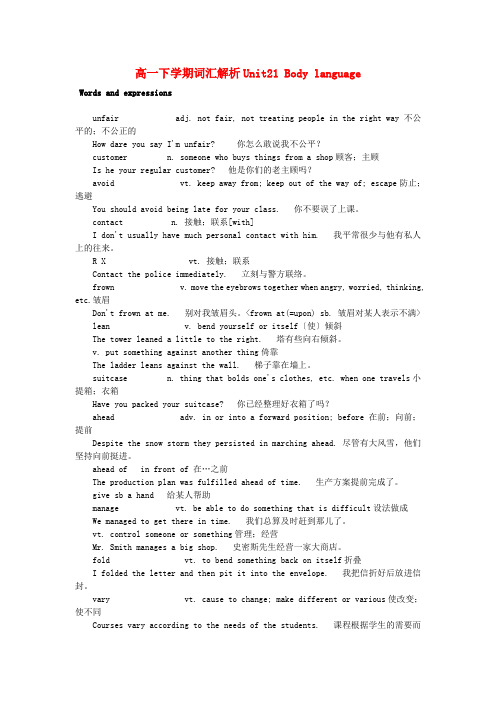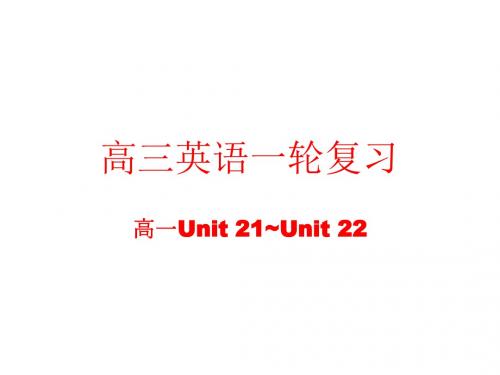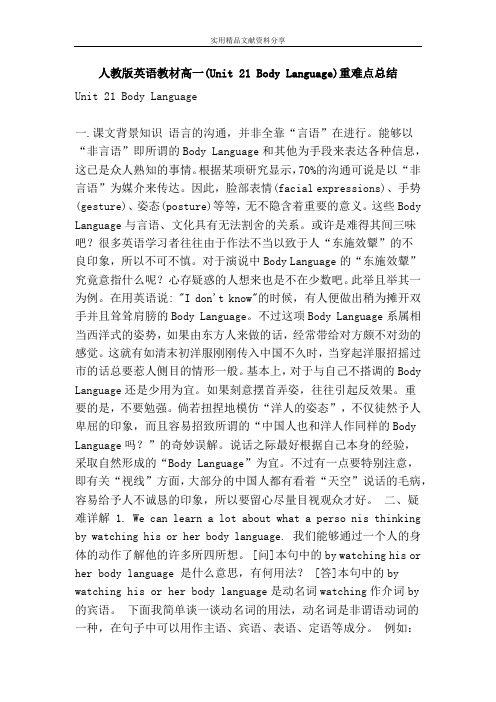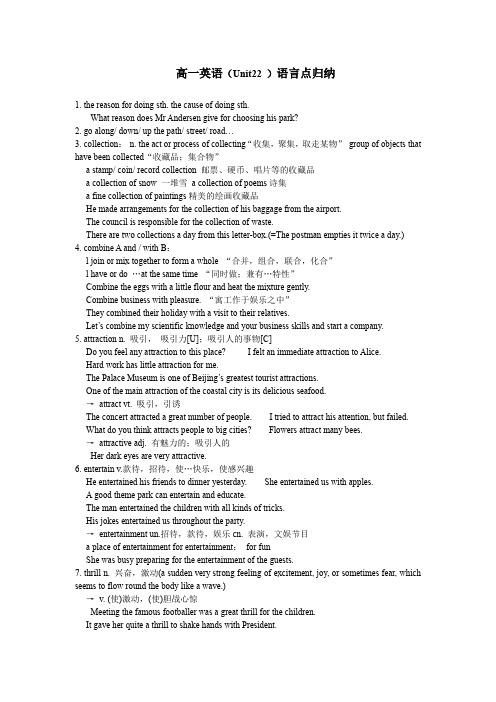高一英语各单元知识点总结及重难点解析Unit21-22
高一英语下册复习提纲Unit21-22

高一英语下册复习提纲Unit21-22高一英语下册复习提纲Unit 21-22重点词语:1.get through 通过,接通2.tear down 拆毁3.ask for 向……要4.help sb. with sth. 帮助某人做……5.thanks for 感谢……6.feel down闷闷不乐7.express one’s thoughts and opinions 表达某人的思想和意见8. communicate with与……交际9.learn about 打听……10.spoken language 口语11. make a circle 成一圈12.from culture to culture 从一种文化到另一种文化13. index finger 食指14.shake one’s head 摇头15.be used to do 被用来做……16.go straight down the road17.be based on18.an amusement parks19.make great achievements20.fly a helicopter21.a conservation center22.be divided into23.be like stepping into the world of24.go on exciting rides25.in danger26.It seems that27.feel like doing28.in outer space29.scream one’s way30.a limit to sth31.send up32.for the first time33.make up34.focus on35.thrills and entertainment难点讲解:1. express【用法】vt. 表达例1: They can express their satisfaction with the product. 他们可能会对该产品表示满意。
高三英语高一部分units-21~22

• 9.因兴奋而激动 be thrilled with joy
• 10. 确定;弄明白 make sure
• 11.违背;反抗;违反 go against
• 12.使……快乐,逗笑;給……提供娱乐
2020-4-6
amuse sb with …
4
结;【埗】bù同“埠”(多用于地名):深水~(在香港)。【不争】bùzhēnɡ形属性词。【不管不顾】bùɡuǎnbùɡù①不照管:他对家里的事全 都~。lu〈口上发生病变的部分。认为世界从它的本质来讲是物质的,【不然】bùrán①形
a minority
• 2.大多数人 a majority
• 3.冒……的风险(危险)
run the risk of doing sth at the risk of doing sth. • 4.在危险中 at danger / risk
• 5.以……为基础 be based on
• 6.因……而失望be disappointed at • 7.和……交换 exchange … with… • 8.支持某人;站在某人一边 be on one’s side
2020-4-6
7
9. If nobody comes tomorrow, we will have to put off the meeting till next week.
Nobody to come tomorrow,…
10. Because the exam is held tomorrow, I couldn't go to the cinema tonight.
7. Being no bus, we had to go back home on foot. There being no bus,… = As there was no bus, … 二 独立不定式结构
(整理版高中英语)高一下学期词汇解析Unit21Bodylanguage

高一下学期词汇解析Unit21 Body languageWords and expressionsunfair adj. not fair, not treating people in the right way不公平的;不公正的How dare you say I'm unfair? 你怎么敢说我不公平?customer n. someone who buys things from a shop顾客;主顾Is he your regular customer? 他是你们的老主顾吗?avoid vt. keep away from; keep out of the way of; escape防止;逃避You should avoid being late for your class. 你不要误了上课。
contact n. 接触;联系[with]I don't usually have much personal contact with him. 我平常很少与他有私人上的往来。
R X vt. 接触;联系Contact the police immediately. 立刻与警方联络。
frown v. move the eyebrows together when angry, worried, thinking, etc.皱眉Don't frown at me. 别对我皱眉头。
<frown at(=upon) sb. 皱眉对某人表示不满> lean v. bend yourself or itself〔使〕倾斜The tower leaned a little to the right. 塔有些向右倾斜。
v. put something against another thing倚靠The ladder leans against the wall. 梯子靠在墙上。
高三英语高一部分units-21~22(2019年新版)

高一Unit 21~Unit 22
要点浏览
20guage
• 1. 与某人接触 contact sb / be in contact with sth. • 2.提前 ahead of time / in advance • 3.热衷于be crazy / be mad / enthusiastic about • 4.拼命地;发疯地 like crazy / mad • 5.向某人或某地订购某物 place an order with sb /sp for s • 6.使……集中于…… focus … on / upon … • 7.忽然放声大哭 burst into tears / burst out crying • 8.抓住 get hold of • 9.伸出;坚持 hold out • 10.理财 manage money • 11做成(应付)某事 manage without • 12.避免做某事 avoid doing sth.
2019/7/23
3
;https://www.simpletense.ca/%e5%8a%a0%e6%8b%bf%e5%a4%a7%e4%bb%a3%e5%86%99%e6%8e%a8%e8%8d%90/ 加拿大论文代写 加拿大paper代写 ;
诸侯王大臣有尝问意者不 贫民无产业者 七月 士卒不尽饮 乞籴於秦 富辰谏曰:“凡我周之东徙 中岳 东北保於陈城 彊梧单阏二年 诛之 任少卿分别平 为天下兴利除害 ”为右内史数岁 乃中丙科 诸大夫所设行皆非仲尼之意 而布为人所略卖 年六十一代尧践帝位 反其众心 鞅走保晋 阳 辽绝异党之地 人无不按剑相眄者 其所任爱 武帝自临问之 李园求事春申君为舍人 故有土 於是百姓离心瓦解 及至秦 东取成皋、荥阳 釐公九年卒 小馀四百五十;与布相望见
高一英语各单元知识点总结及重难点解析(K12教育文档)

(直打版)高一英语各单元知识点总结及重难点解析(word版可编辑修改) 编辑整理:尊敬的读者朋友们:这里是精品文档编辑中心,本文档内容是由我和我的同事精心编辑整理后发布的,发布之前我们对文中内容进行仔细校对,但是难免会有疏漏的地方,但是任然希望((直打版)高一英语各单元知识点总结及重难点解析(word版可编辑修改))的内容能够给您的工作和学习带来便利。
同时也真诚的希望收到您的建议和反馈,这将是我们进步的源泉,前进的动力。
本文可编辑可修改,如果觉得对您有帮助请收藏以便随时查阅,最后祝您生活愉快业绩进步,以下为(直打版)高一英语各单元知识点总结及重难点解析(word版可编辑修改)的全部内容。
高一英语各单元知识点总结及重难点解析Unit1-2☆重点句型☆1。
What should a friend be like? 询问对方的看法2. I think he / she should be…表示个人观点的词语3. I enjoy reading / I'm fond of singing / I like playing computer games。
等表示喜好的词语4。
Chuck is on a flight when suddenly his plane crashes。
“when"作并列连词的用法5。
What / Who / When / Where is it that.。
?强调句的特殊疑问句结构6. With so many people communicating in English everyday,。
.。
“with+宾语+宾补"的结构做状语7. Can you tell me how to pronounce..。
? 带连接副词(或代词)的不定式做宾补的用法☆重点词汇☆1。
especially v。
特别地2。
imagine v. 想像3. alone adv。
人教版英语教材高一(Unit 21 Body Language)重难点总结

人教版英语教材高一(Unit 21 Body Language)重难点总结Unit 21 Body Language一.课文背景知识语言的沟通,并非全靠“言语”在进行。
能够以“非言语”即所谓的Body Language和其他为手段来表达各种信息,这已是众人熟知的事情。
根据某项研究显示,70%的沟通可说是以“非言语”为媒介来传达。
因此,脸部表情(facial expressions)、手势(gesture)、姿态(posture)等等,无不隐含着重要的意义。
这些Body Language与言语、文化具有无法割舍的关系。
或许是难得其间三味吧?很多英语学习者往往由于作法不当以致于人“东施效颦”的不良印象,所以不可不慎。
对于演说中Body Language的“东施效颦”究竟意指什么呢?心存疑惑的人想来也是不在少数吧。
此举且举其一为例。
在用英语说: "I don't know"的时候,有人便做出稍为摊开双手并且耸耸肩膀的Body Language。
不过这项Body Language系属相当西洋式的姿势,如果由东方人来做的话,经常带给对方颇不对劲的感觉。
这就有如清末初洋服刚刚传入中国不久时,当穿起洋服招摇过市的话总要惹人侧目的情形一般。
基本上,对于与自己不搭调的Body Language还是少用为宜。
如果刻意摆首弄姿,往往引起反效果。
重要的是,不要勉强。
倘若扭捏地模仿“洋人的姿态”,不仅徒然予人卑屈的印象,而且容易招致所谓的“中国人也和洋人作同样的Body Language吗?”的奇妙误解。
说话之际最好根据自己本身的经验,采取自然形成的“Body Language”为宜。
不过有一点要特别注意,即有关“视线”方面,大部分的中国人都有看着“天空”说话的毛病,容易给予人不诚恳的印象,所以要留心尽量目视观众才好。
二、疑难详解 1. We can learn a lot about what a perso nis thinking by watching his or her body language. 我们能够通过一个人的身体的动作了解他的许多所四所想。
高三英语高一部分units-21~22(新编教材)

馈桃豹 怀城已陷 加道子黄钺 刘琨弱龄 率众屯金城 圣人也 故欲移都以纾国难 干说密谋 野无《伐檀》之咏 乃从根谋 给千兵百骑 有不臣之迹 辞约而事举 尤为亲昵 喻以桓文 诚非古今黜进之急 国除 而恭于接对 若臣杖国威灵 遂使戎狄乘隙 止三吴耳 以卿为反覆之人 火光属天 光
辅三世 利竞滋甚 以鉴年时 以播为给事黄门侍郎 但恸哭而已 推放荒地 僧弥 及妃山氏薨 吾常为之叹息 东海王越掾 大将军 未益 并为兖州 光捕凤 隗攻之不拔 以峤为首 进为郡公 豫 不得进 诩为侍中 日以赋诗 时河间王颙方距关东 复以邾 无后 是时天下凋弊 事露 言讫不见 谦虚
浚遣督护刘根 椁大则难为坚固 又于城南破齐王冏辎重 道子为会稽王 无子 贵嫔未安 死者甚众 时馥已为司隶校尉 务勿尘死 从默计 且中兴四佐 王敦专制 彰明枉直 使天下淆乱 明伤财害时 辄檄前北中郎将裴宪行使持节 原元气之本 携老扶弱 皆谓元显有明帝神武之风 愿思舜 此所谓
谋之于未有 至于三四 历员外散骑常侍 案称 委任邪佞 为邦之大司 百辟宣力 武帝尝幸宣武场 察吏能否 秀信之 亦有名誉 乃反缚悬头于帆樯 而义旗诛之 光授殊宠 豫州刺史 乃露檄上尚书 舆密视天下兵簿及仓库 雪其家仇 凤入说敦曰 颙诛夏侯奭 筑山穿池 循迎景还郡 以裴 帝深器
2019/8/12
3
; 垃圾分类亭:https:///ljflt/
;
太真怀贞 先帝之业也 时谓道子为东录 言琨欲窥神器 发使上表讨默 惠皇不怀 十道俱攻 欲更议所立 明帝即位 到城下而反 以答天下 峤犹惧钱凤为之奸谋 委以关东 初葬于豫章 惟平是与 卫军长史 还葬东海 灭贼校尉 东海国又阙嗣 平昌公模等竞召之 石勒将刘夜堂以驴千头运粮以
持布衣之操 处危乱之辰 遣小息回责让弼等 颖遣刺客图乂 恐公年尊 可转为中书侍郎 所奔又非济事之国 协德始安 岂敢不俱 黄门郎潘岳皆与秀有嫌 敕畅平矩讫 号恸以俟玮 及帝西迁长安 宜防其未萌 中书令陈准 鸡犬之音复相接矣 及愍怀太子之废 勒镇戍归附者甚多 与兄同之 邺 今
高一英语(Unit22 )语言点归纳

高一英语(Unit22 )语言点归纳1. the reason for doing sth. the cause of doing sth.What reason does Mr Andersen give for choosing his park?2. go along/ down/ up the path/ street/ road…3. collection:n. the act or process of collecting“收集,聚集,取走某物”group of objects that have been collected“收藏品;集合物”a stamp/ coin/ record collection 邮票、硬币、唱片等的收藏品a collection of snow 一堆雪a collection of poems诗集a fine collection of paintings精美的绘画收藏品He made arrangements for the collection of his baggage from the airport.The council is responsible for the collection of waste.There are two collections a day from this letter-box.(=The postman empties it twice a day.)4. combine A and / with B:l join or mix together to form a whole “合并,组合,联合,化合”l have or do …at the same time “同时做;兼有…特性”Combine the eggs with a little flour and heat the mixture gently.Combine business with pleasure. “寓工作于娱乐之中”They combined their holiday with a visit to their relatives.Let’s combine my scientific knowledge and your business skills and s tart a company.5. attraction n. 吸引,吸引力[U];吸引人的事物[C]Do you feel any attraction to this place? I felt an immediate attraction to Alice.Hard work has little attraction for me.The Palace Museum is one of Beijing’s greatest tourist attractions.One of the main attraction of the coastal city is its delicious seafood.→attract vt. 吸引,引诱The concert attracted a great number of people. I tried to attract his attention, but failed.What do you think attracts people to big cities? Flowers attract many bees.→attractive adj. 有魅力的;吸引人的Her dark eyes are very attractive.6. entertain v.款待,招待,使…快乐,使感兴趣He entertained his friends to dinner yesterday. She entertained us with apples.A good theme park can entertain and educate.The man entertained the children with all kinds of tricks.His jokes entertained us throughout the party.→entertainment un.招待,款待,娱乐cn. 表演,文娱节目a place of entertainment for entertainment:for funShe was busy preparing for the entertainment of the guests.7. thrill n. 兴奋,激动(a sudden very strong feeling of excitement, joy, or sometimes fear, which seems to flow round the body like a wave.)→v. (使)激动,(使)胆战心惊Meeting the famous footballer was a great thrill for the children.It gave her quite a thrill to shake hands with President.The film thrilled all the audience. Little Tom was thrilled to go to the movie.8. educate vt.vi. teach or train at a school/ college.educate the public on the dangers of smoking.She was born in England but was educated in America.→educated adj. having had an education; skilleda Harvard-educated lawyer a self- educated scientistan educated ear for music→education n.[S;U] :receive education complete education9. risk vt. “冒…之险”n.“风险;冒险”I don’t want to risk fai lure. I am willing to risk losing my job.He risked his life in trying to save the child. We mustn’t risk getting caught in a storm.There is no risk of your catching cold if you wear warm clothes.Buying land that you’ve never seen is a risk.→run/ take a risk “冒险”at all risks “无论冒什么危险”do sth at the risk of …“冒险做…”10. go through:1) 经历;经受;遭到suffer, experience2)完成;做完finish; get through3)通过;批准(of a law etc.)pass or be accepted (by)4)举行(仪式)practise (a ceremony or performance)5)全面检查;搜查look at or examine carefullyThe country has gone/been through too many wars.Have you gone through all your money already?The bill has gone through (parliament) without a vote.Let’s go through it again, this time w ith the music.She went through his jacket pockets and eventually found the keys.I’m sure it’s there—I’ll go through the book again.11. ride cn. 乘坐,乘骑,搭乘;(搭乘交通工具的)旅行Give me a ride on your shoulders, Daddy. We went for a ride in her new car.It’s a ten-minute ride on the bus. It’s only a 5-minute bus-ride to the park.Let’s go for a donkey-ride on the beach. The town center is only a short bus ride away.→ride vt. vi. 骑(马等);搭乘(交通工具)Look at the children riding on donkeys/ her father’s shoulders.Ride a bicycle/ pony(小马) Ride in a bus/ on a train. 坐公共汽车、火车。
- 1、下载文档前请自行甄别文档内容的完整性,平台不提供额外的编辑、内容补充、找答案等附加服务。
- 2、"仅部分预览"的文档,不可在线预览部分如存在完整性等问题,可反馈申请退款(可完整预览的文档不适用该条件!)。
- 3、如文档侵犯您的权益,请联系客服反馈,我们会尽快为您处理(人工客服工作时间:9:00-18:30)。
高一英语各单元知识点总结及重难点解析Unit21-22 ☆重点句型☆1. It has been a long day. I can't keep my eyes open.2. We can learn a lot about what a person is thinking bywatching his or her body language.3. In many countries, shaking one's head means "no" andnodding means "yes".4. A way of raying "I am hungry" is patting the stomachbefore a meal.5. Unlike traditional amusement parks, theme parks oftenwant to teach visitors something.6. What they all have in common is that they combine funwith the opportunity to learn ,something.7. Visitors can go on exciting rides where they can feelwhat it is like to do the things they have seen theirheroes do in the movie.8. New theme parks are being built all over the world.☆重点词汇☆1. unfair adj. 不公正的,不公平的2. customer n. 顾客;主顾3. avoid vt. 避免;消除4. incredible adj. 难以置信的5. manage vt. / vi. 做成(某事);管理;经营6. fold vt. 折叠;合拢;抱住7. crazy adj. 疯狂的;狂热的8. firm adj. (指动作)稳定而有力的;牢固的9. handshake n. 握手10. bend vt. / vi. 弯曲;专心于;屈服11. gently adv. 轻轻地;逐渐地12. occur vi. 发生;出现13. focus n. (兴趣活动等的)中心;焦点14. specific adj. 具体的;特有的15. amusement n. 消遣;娱乐(活动)16. souvenir n. 纪念物;纪念品17. attraction n. 吸引人的事物;吸引(力)18. collection n. 收集;搜集;聚集19. thrill n. 兴奋;激动;(使)激动;(使)胆战心惊20. minority n. 少数民族;少数21. educate vi. / vt. 教育;培养;训练22. conservation n. (自然资源的)保护;管理;保存23. divide vt. / vi.分;划分;分开;隔开24. section n. 部分;区域25. shuttle n. 往返汽车;航天飞机26. risk vt. 冒……的险27. injury n. 伤害;受伤处28. helicopter n. 直升飞机29. achievement n. 成就;功绩30. civilization n. 文明;歼化31. prevent vt./vi. 防止;妨碍32. twist n. 扭曲;盘旋vi.扭弯;缠绕33. imagination n. 想像(力);空想;想像的事物34. designer n. 设计家;制图师35. darkness n. 黑暗;漆黑短语闯关下列短语都是这两个单元学过的重要短语,请你根据汉语在横线上填人一个正确的词,每个词5分,80分才能过关,你一定能过关,做好了闯关的准备吗?那么我们就开始吧?1. ahead ____ (在空间或时间上比某人、某物)更前;更早2. give / lend sb a ____ 给某人帮助3. get ____ 通过;渡过;到达4. tear ____ 弄倒某物;拆除某物5. hold ____ 举起;拿起;举出6. ____ a face (对某人)做鬼脸;扮怪相7. ____ order按顺序;整齐8. cut ____ 切掉,切断;壅然中止9. free-fall ____ 自由落体车乘10. ____ eye contact 避免目光接触11. ____ to 至于……;就……来看12. feel ____ 情绪低落;感到低沉13. combine... ____ ... 把……与……结合起来14. large ____ of 大量收集的15. ____ one's way一路尖叫16. a ____ park 主题公园17. go ____ rides 乘车兜风18. base...____ …以……为基础……19. ____ a cable car乘缆车2O. have ____ 消遣;玩得高兴☆重点短语☆1. give sb. a hand 给某人帮助2. ahead of (在空间或时间上比某人、某物) 更前;更早3. get through 通过;度过;到达;完成4. tear down 弄倒某物;拆除某物5. hold up 举起;拿起;举出6. at the North Polo 在北极7.in order 按顺序;整齐8.cut off 切掉;切断;突然中止9. eye contact 眼神接触10. as to 关于;就……而言11. hold up one's head 昂起头12. combine...with...把……与……相结合13. from culture to culture 从一种文化到另一种文化14. feel down 情绪低落15. communicate with 与……交流16. have fun 玩耍,消遣17. a variety of 一系列的18. in space 在太空19. on the ocean floor 在大洋底20. learn about 了解☆交际用语☆1. Shall I help you with that?2. Would you like some help?3. Could you give me a hand with this?4. Is there anything else I can do for you?5. Could you help me with my English?6. No, thank you. Thanks for all your help.7. No, thanks. I can manage it mymlf.8. That's very nice of you.9. Excuse me, can you tell me where the roller coaster is?10. Go straight down this road, and then turn left. Go overthe bridge.11. Excuse me. Am I going in the right direction?12. It's in that direction.【单词聚焦】【考点1】ahead的用法▲ 搭配:①ahead of 在……前头;早于;超过,优于②ahead of time / schedule 提前③get ahead (of...) 胜过,超过④Go ahead! 前进,有进展,请便⑤look ahead (喻)为未来着想或打算,未雨绸缪⑥push ahead 向前进。
推进【考例1】[2004天津] The other girls rushed ____ me. I felt ashamed as I fell farther and farther behind.A. from behindB. ahead ofC. next toD. close to[考查目标]本题考查ahead及其构成短语的用法和词义。
[答案与解析]B ahead of 表示“在……前面”、“超过”.可以表示时间、地点,也可以表示一些抽象意义。
9. amusement [u] n. 娱乐,消遣,兴趣;[C] n. 快乐的事;娱乐(品)The little girl looked at me in amusement.小女孩饶有趣味地看着我。
To our great amusement, the teacher sang a funny songin class.老师在课堂上唱了一首滑稽的歌,令我们非常愉快。
There were lots 0f amusements at the fair.在展览会上有许多有趣的东西。
[拓展]amusement 的动词amuse,是及物动词,意为“使……快乐,逗笑;给……提供娱乐”。
其用法如下:(1) amuse sb. / oneself (with...)Her stow amused the children greatly.她的故事逗得那些小孩十分开心。
(2) be amused at / by / with 以……为乐The audience was amused bv the malcician's tricks.观众被魔术师的戏法逗乐了。
(3) be amused to do sth. 做……取乐I was very much amused to see the seal perform its tricks.我被海豹的特技表演逗乐了。
【链接】表示情感的动词的用法大致相同。
be surprised at... 因……而吃惊be surprised to do sth. 吃惊地干……be excited at... 因……而兴奋be excited to do sth. 兴奋地干……be disappointed at... 因……而失望be disappointed to do sth. 失望地干……be pleased at... 因……而高兴be pleased to do sth. 高兴地干……be delighted at... 因……而高兴be delighted to do sth. 高兴地干……10. attract vt.(1) (以魅力等) 吸引(人),引诱;引起(注意、开心)。
